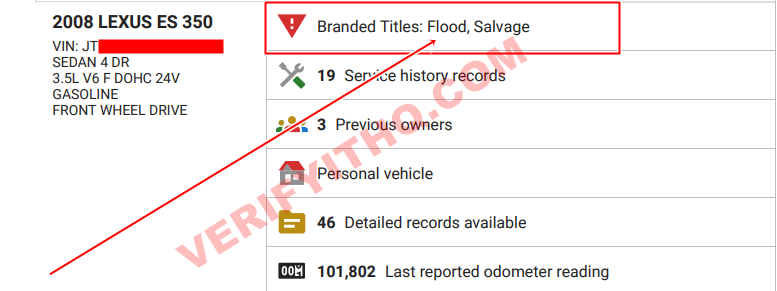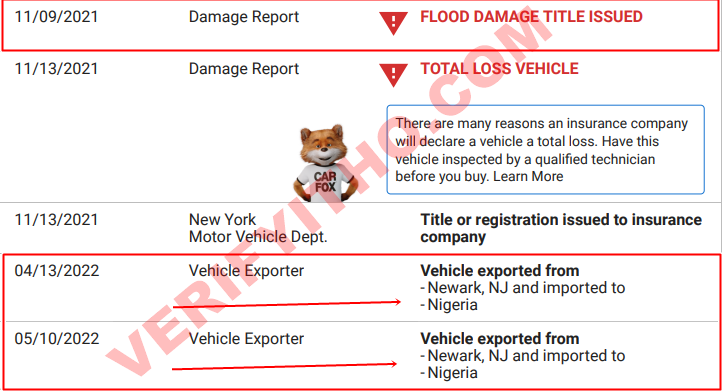Why You Should Never Buy a Flood-Damaged Car
Started 6 months ago by Verifyithq in 🚙 Automotive / General Vehicle Topics
Flood-damaged vehicles can look perfect but hide serious problems that cost you safety and money. Learn how to spot them
Body
In the wake of heavy rainfall or flash flooding, one thing often goes unnoticed amid the chaos: flood-damaged vehicles quietly making their way into the used car market. These vehicles, often cleaned up and disguised, pose serious safety, financial, and health risks to unsuspecting buyers.
Why Flood-Damaged Cars Are a Silent Threat
At first glance, a flood-damaged car may appear perfectly fine. A fresh paint job, cleaned carpets, and a polished exterior can easily mask the underlying issues. But beneath the surface, moisture can corrode vital components, compromise electronics, and create a breeding ground for mold.
Here’s why buying a flood-damaged vehicle is a high-risk decision:
-
Electrical system failure: Water can short-circuit the car’s brain—its onboard computer and wiring—leading to unpredictable or total failures.
-
Engine and transmission damage: Water in the engine or transmission can cause irreversible harm, which may not be immediately evident.
-
Brake and airbag malfunctions: Moisture can reduce braking efficiency or disable safety systems like airbags—putting lives in danger.
-
Resale nightmare: Even if the car appears to work, its flood history significantly reduces resale value and can void warranties.
Real Example: A 2008 Lexus ES 350 Flooded in the U.S. — Now in Nigeria
Let’s take a real-world case:
A 2008 Lexus ES 350, originally sold in the United States, was severely flood-damaged during a hurricane event. The car was declared a total loss by the insurance company due to extensive water damage, which included:
Electrical faults
Interior mold
Water in the engine compartment
Despite the damage, the car was cleaned, cosmetically repaired, and exported to Nigeria. Once it arrived, it was listed as a "clean" foreign used (tokunbo) car—no mention of its flood history. A buyer who didn’t run a proper check ended up purchasing it, only to face recurring electrical failures, warning lights, and brake issues within months.
This is not a rare case—it’s a recurring pattern that affects thousands of car buyers each year.




How to Avoid Buying a Flood-Damaged Car
To help buyers stay safe and informed, our team at VerifyItHQ.com created a comprehensive guide:
👉 5 Ways to Spot a Flood-Damaged Car
Here’s a quick recap of that essential guide:
-
Check for musty odors and signs of mold or mildew under seats and carpets.
-
Look for water stains, rust, or discoloration in unusual places—like under the dashboard or spare tire well.
-
Test all electronics—windows, lights, wipers, and infotainment systems.
-
Review service records for suspicious gaps or sudden location changes.
-
Inspect for new upholstery or carpeting—a tell-tale sign of cover-up.
But beyond visual checks, run a comprehensive vehicle history report—it’s your best protection.
Tools That Protect You: VerifyItHQ.com & AutoBayNG.com
VerifyItHQ.com
This platform is your first line of defense. With just a Vehicle Identification Number (VIN), VerifyItHQ provides a detailed vehicle history report, flagging:
-
Flood damage
-
Salvage titles
-
Auction photos
-
Odometer issues
-
Insurance write-offs
Don’t let a polished car fool you. Always verify before you buy.
AutoBayNG.com
If you're buying a car, do it through a trusted platform. AutoBayNG.com lists vehicles that are screened and verified, often using VerifyItHQ reports. This helps you avoid bad actors and focus on clean, reliable options.
Final Thoughts
The rise in flood-damaged vehicles post-rainy season is real—and dangerous. But with the right knowledge and tools, you don’t have to become a victim.
Before you hand over your hard-earned money, take a minute to:
-
Inspect the car using our flood damage checklist
-
Run a vehicle history report on VerifyItHQ.com
-
Shop safely via AutoBayNG.com
When it comes to your safety and finances, don’t take chances. Stay alert, stay informed, and always verify before you buy
-
No one is replied to this thread yet. Be first to reply!

